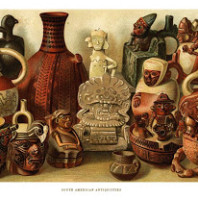I, like many a young academic sort in the age of social media, have a profile on www.academia.edu. In an effort to find a job (still working on that), I filled that profile with nearly everything that I have done, and everything that I can freely share on the internet. Academia.edu not only notifies you when someone looks at one of your papers, they record (I think for up to a month) the search terms that brought people to a particular paper.
For a while now I have noticed that people come to my illicit antiquities papers through slightly shocking searches. People seem to find me through searches aimed at importing or buying Latin American antiquities rather than searches aimed as preventing antiquities trafficking. I have mostly just been frowning at the computer whenever it happens but perhaps I will start documenting the searches here each month: my own little foray into the shape of the antiquities trade as it relates directly to me.
In the last month, random individuals found my academia.edu page through 38 different keywords. Leaving out the non-illicit antiquities searches we have the following (spelling mistakes and caps in the original searches):
Negative Search Terms (These people want to buy and sell antiquities now)
- importing antiques from south america colombia
- exporting antiquities south america
- south american art for sale
- christies pre-columbian art market
- pre-columbian art dealers
- peruvian huacos antiques collector sites
- peruvian huacos sotheby
- importation of pre-columbian monumental or architectural sculpture or murals
- value of south american ceramics
Could go either way (But these people probably want to buy and sell antiquities)
- peruvian antiquities x2
- regulation of importation of pre-columbian monumental or archaeological
- peru pre conquest object
- moche portrait vessel forgery
Positive Searches (These people are doing illicit antiquities research)
- illicit antiquites from South America x2
- WHEN DID U.K. SIGN THE UNESCO TREATY INVOLVING SMUGGLING ARTIFACTS FROM SOUTH AMERICA
- what year was the ban on import of pre-columbian antiquities 1972?
I like to think that they landed on a paper or my dissertation and got shamed out of making purchases but that is too much to ask for.
I see potential here. A larger, more comprehensive illicit antiquities website paired with the more robust Google Analytics might actually give us a window into how internet users are researching potential antiquities purchases. I am only one person with a few Latin American-focused papers. A larger, comprehensive Illicit Antiquities website (the S.A.F.E. website perhaps?) would come up on more searches and would have a wider variety of search terms to analyze. We can start thinking about buyers who conduct internet research as a group: What are their concerns? How do they describe the kinds of things they want to buy and sell? How does the terminology differ?
If we understand how they search and what sorts of pages they land on via their searches, we can think about presenting targeted “you shouldn’t buy this stuff” literature online.
